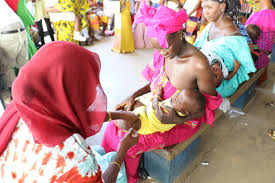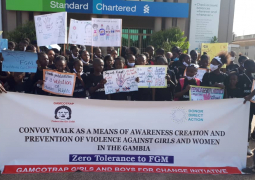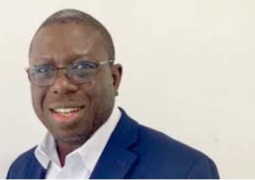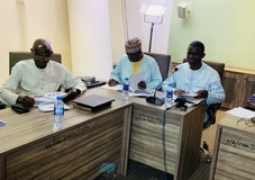
This sparked global attention and misinformation about the virus. The United Nations Secretary General, Antonio Guterres, taking on twitter on the proliferation of false information about the virus stated; “Our common enemy is #COVID19, but our enemy is also an “infodemic” of misinformation”.
Back home, in the small settlement of Sare Fonkoi, in the Jarra West District, Lower River Region, women didn’t take it lightly regarding the information circulated around the virus.
Sohna Bah, a middle-aged woman and a mother of two, speaking to this reporter said she heard a lot of information about the virus including that of health officials who diagnosed patients with the virus that visits health facilities.
This, she said instilled fear in a lot of women in her community. As a result, she added; “even if you are extremely sick up to the point of death, you preferred staying at home rather than visit a health centre.” says Sohna, a nursing mother.
Under normal circumstances, she should visit the clinic on a routine basis for medical checkup on her son, but because of the heightened fear of contracting the virus in the hospital, her son stayed for about seven months without going to hospital for check up.
This, she further explained changed her mind set and even resort to using local herbs and visiting traditional healers in the community whenever she suspects the son is sick.
Recently, Sohna decided to visit Soma District Hospital. Awaiting her name to be called by public health officials, her son aged about two is tied on her back. The young boy is coughing incessantly with a runny nose.
“The boy has a chest pain”, she told me in her local Fula dialect. His body looks weak and his eyes dizzy. “I have been enduring difficult moments since he developed this sickness. He would refuse to lie down or even sit. He is always on my back even as I move around the home to do my household chores”.
A year ago, Sohna would prefer enduring the pain that comes with caring for her sick son than bring him to the hospital. She feared that nurses at the only hospital accessible to her community would diagnose her son with Covid.
Mariam Jawo is a nursing mother too. During the peak of the corona virus in the country, she was about six months pregnant.
According to her, those days were nightmares. In the Fula language she told me, “even our men advised us not to visit the hospital. They were also fearful. What I used to do every morning is to boil leaves and drink to ease the pain I felt”.
In a community like hers, traditional birth attendants are very much valued. With the continuous circulation of falsified information about the virus, Mariam was at the mercy of older women tagged as birth attendants. This is her second visit to the hospital after delivery. She wouldn’t have visited the hospital if there hadn’t been a decline in recorded COVID cases in the country.
She explains; “There was a time even coming to Soma was a problem for me not to talk about visiting the hospital. We heard positive cases were recorded in the hospital and even some nurses were infected.”
For Jainaba Sallah, she frequently visited the hospital despite the disinformation being circulated. She said though she had the fear of contracting the virus, she visited the hospital anytime she felt unease.
“What I normally do before coming is to wear my mask and I also used to wash my hands at the entrance of the hospital and when leaving the hospital”.
Public Health Officials at the Soma District hospital confirmed that there was a significant decline in the number of patients visiting the hospital during the height of the COVID period.
Mariama Gomez is a Public Health Officer at the hospital. She said; “mothers were not coming to the clinic. Even us if we meet them in the streets if we want to talk to them, they will tell us our hospital is infected with COVID-19 and that is why they don’t come to the hospital now”.
The hospital, according to her, is taking steps to mitigate the impacts of this global pandemic.
Sare Fonkoi is in the Kabada corridor of The Gambia. Women in communities around this end travelled kilometers to access the nearest health facility. It is a growing concern among women that the distance they travel to access health facilities is long, thus the need for clinics around their communities to ease the travel burden on them.
Read Other Articles In National News

Gamcotrap ambassadors for change observes Int’l Day of Zero Tolerance on FGM
Feb 22, 2022, 12:56 PM




